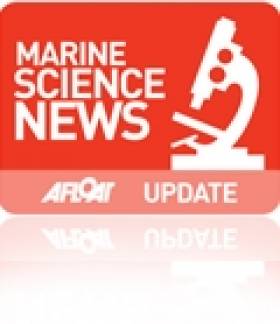Displaying items by tag: EurOCEAN
The Eurocean Youth Network and the Work of Irish Maritime Ambassador Domonique Gillen
Several months ago, images of a long silver streak on the water surface of the Bay of Biscay went viral on social media. The streak was created by an estimated 100,000 dead fish dumped by Dutch-owned trawler Margiris, one of the world’s largest fishing vessels.
French minister for the Sea Annick Girardin ordered an administrative inquiry into the incident when it became public in early February. It. occurred as a team of young European “maritime ambassadors” were meeting virtually in La Rochelle as part of France’s EU presidency – working with NGO Surfrider Europe.

The 106 ambassadors agreed on 11 recommendations, which were presented to Minister Girardin and her European counterparts.

Implementation of an EU-wide maritime surveillance and enforcement programme for the Common Fisheries Policy, and investment in reskilling of people employed in “disappearing” marine sectors were among the recommendations. The group also called for a marine Erasmus programme with a focus on education and employment.
 The One Ocean Summit which Eurocean youth ambassadors addressed, including Ireland's ambassador Domonique Gillen
The One Ocean Summit which Eurocean youth ambassadors addressed, including Ireland's ambassador Domonique Gillen
Ireland’s ambassador Domonique Gillen, a marine biologist who is involved with the Ocean Research and Conservation Association based in Cork, spoke to Wavelengths about how she took up marine science, and about the work of the newly created Eurocean Youth Network.
#MarineScience - On 20 June last, the European Marine Board presented its blueprint for the next phase of seas and oceans research in Europe to EU Commissioner for Research, Innovation and Science Máire Geoghegan-Quinn and Maria da Graça Carvalho, MEP and European Parliament Rapporteur for the Horizon 2020 Programme, at a special event in the Royal Flemish Academy of Belgium for Science and the Arts in Brussels.
Navigating the Future-IV is an opinion paper representing the views of the European marine science community of the major challenges and opportunities for marine science in Europe to support so-called 'blue growth', prepared by the European Marine Board, a network of 36 European marine research centres from 20 countries.
The current report is structured to inform the research challenges identified by the EU Horizon 2020 Programme in terms of basic research such as understanding ecosystem functioning, as well as the major societal challenges facing Europe over the next decade including health, food security, energy, climate change and raw materials.
Presenting the paper, European Marine Board chair Dr Kostas Nittis recalled the Ostend Declaration of 2010, which called for marine sciences to be recognised as one of great challenges of the 21st century.
He noted that the recent EU Blue Growth Strategy represented the marine component of the Europe 2020 Strategy for smart, sustainable and inclusive growth and he acknowledged the support given to marine science, technology and innovation in the EU’s seventh Framework Programme (2007-2013) including the Ocean of Tomorrow initiative.
Welcoming the report, Commissioner Geoghegan-Quinn acknowledged its relevance and timeliness as the commission and member states were now about to embark on defining the specific topics that would be open to competitive co-funded research under the €80 billion Horizon 2020 Programme spanning the period 2014-2020.
She also welcomed the inclusion of chapters on the need for a European Ocean Observing System and for improvements in ocean literacy amongst European citizens, noting that these two topics were also addressed at the recent Irish EU-Presidency Meeting held in Galway from 23-24 May.
This meeting resulted in the signing of the Galway Statement on Atlantic Research Co-operation by Canada, the USA and the European Union, which represents the first step in internationalising the recently adopted Atlantic Strategy Action Plan.
Carvalho, meanwhile, highlighted the vital role that the marine sector plays in the blue economy which she said is “central to Europe's prosperity and well‐being".
She noted the progress the European Union had made in recent years in recognising that the union had a very important marine dimension, now formally recognised in the Integrated Maritime Policy for the European Union (2007) and its various sea-basin strategies.
She also reported that the European Parliament was aware of the importance of the EU’s maritime interests and had recommended that marine science and blue growth be recognised as one of a number of priority cross-cutting themes to be addressed by the Horizon 2020 Programme.
Geoffrey O’Sullivan, representing the Marine Institute and a member of the European Marine Board, noted that the priories identified in Navigating the Future-IV complemented those in the Irish Marine Plan, Harnessing Our Ocean Wealth, launched by the Government in July 2012.
And according to Ciara Delaney, Irish maritime attaché in Brussels, Navigating the Future-IV reinforces the research priorities included in the recent European Union Atlantic Action Plan (2014-2020) agreed by France, Ireland, Portugal, Spain and the UK, which was launched in Galway on 24 May by EU Commissioner for Maritime Affairs and Fisheries Maria Damanaki.
The Brussels event also launched the EurOCEAN 2014 conference as an Italian-EU Presidency event with a focus on marine science grand challenges.
EurOCEAN 2014 will be held in Rome on 7‐9 October 2014. Announcing the conference, Prof Enrico Brugnoli of the National Research Council in Italy (CNR) said that it “is one of the most important events in marine and maritime research for both scientists and policy makers”.
The conference will be the eighth in a very successful series of European marine science conferences, initiated in Brussels in 1994, and including the EurOCEAN 2004 conference held in Galway.
























































